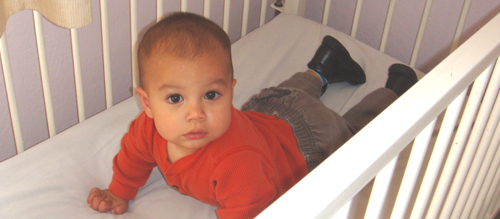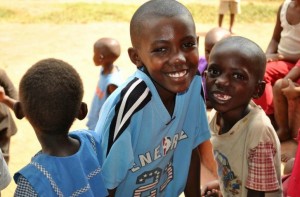Children of All Nations partners with countries around the world to place some of the world’s most vulnerable children, including those exposed to HIV. According to the Global HIV/AIDS response progress report for 2011 3.4 million children age 15 and younger are living with HIV. Many of these children may be orphaned by this disease or in the care of the social welfare system. In the hope of providing these children with a loving family to attend to their medical and emotional needs, Children of All Nations works to advocate, educate, and provide resources to potential families who will open their hearts and minds to these special children.
Information about adopting a child with HIV
 According to the National Institute of Health, the life expectancy of HIV-positive people who have access to medical care is about the same as non-infected people. The key factor is having access to medical care. Many of the children available for adoption may not have that access unless they are adopted. If you are considering adopting a child exposed to HIV – you will want to understand the disease and how to meet the child’s medical and emotional needs.
According to the National Institute of Health, the life expectancy of HIV-positive people who have access to medical care is about the same as non-infected people. The key factor is having access to medical care. Many of the children available for adoption may not have that access unless they are adopted. If you are considering adopting a child exposed to HIV – you will want to understand the disease and how to meet the child’s medical and emotional needs.
What is HIV?
-
- HIV stands for Human Immunodeficiency Virus. If left untreated HIV can progress and develop into AIDS.
- AIDS stands for Acquired Immune Deficiency Syndrome, and occurs when HIV advances and weakens the immune system to the point that the body can no longer fight off illness and infections.
- While there is currently no cure for HIV or AIDS, the medications that are now available to treat HIV are highly effective. HIV is now considered a chronic illness, rather than a terminal disease. HIV positive individuals who are receiving treatment can live indefinitely without developing AIDS.
- Studies show that people who are HIV+ and have access to treatment can have close to normal life expectancy. HIV+ children can grow up, get married, have healthy babies and can expect to live long enough to meet their grandchildren.
Frequently Asked Questions
1) Will adopting a child with HIV/AIDs put my other family members at risk?
2) How is the virus spread?
 HIV is spread by direct contact with HIV-infected body fluids, such as blood, vaginal secretions, semen or breast milk.
HIV is spread by direct contact with HIV-infected body fluids, such as blood, vaginal secretions, semen or breast milk.3) How should blood spills be handled?
4) Will a family’s existing insurance policy cover an adopted HIV/AIDS-exposed child?
5) What information about an HIV/AIDS-infected child needs to be disclosed?
6) Is it true that many infants who test HIV positive at birth convert to negative within the first year or so?
What is the treatment?
 Once diagnosed, the child will need to be monitored for the amount of virus in the blood (viral load) and the strength of his/her immune system (CD4 count, also called helper T cells). There are more than 20 medications approved by the FDA for the treatment of HIV. These medications decrease the amount of the virus in the body with a goal of undetectable virus in the bloodstream. This treatment will be life long and is usually called ART or HAART (Highly Active Antiretroviral Treatment). The most important part of the treatment is to ensure that the doses are taken on time and without missing any doses—which helps to prevent resistance by HIV to the medication. The goal of treatment is for the viral load to be undetectable and for the immune system to be strong. Follow-up appointments to check CD4 counts and viral loads will be every three to four months after that point.
Once diagnosed, the child will need to be monitored for the amount of virus in the blood (viral load) and the strength of his/her immune system (CD4 count, also called helper T cells). There are more than 20 medications approved by the FDA for the treatment of HIV. These medications decrease the amount of the virus in the body with a goal of undetectable virus in the bloodstream. This treatment will be life long and is usually called ART or HAART (Highly Active Antiretroviral Treatment). The most important part of the treatment is to ensure that the doses are taken on time and without missing any doses—which helps to prevent resistance by HIV to the medication. The goal of treatment is for the viral load to be undetectable and for the immune system to be strong. Follow-up appointments to check CD4 counts and viral loads will be every three to four months after that point.
It is recommended that all children less than one year of age who have HIV be treated with medication, as they become ill more quickly than older children and adults.
Questions to ask yourself and your family
- Why are you considering the adoption of a child who is living with HIV?
- What are your expectations about parenting a child who is living with HIV?
- What are your expectations about the effects parenting a child living with HIV may have on your family? Have you talked with all family members about the expectations and discussed potential changes? How do you anticipate dealing with these potential changes?
- Do you have experience with or do you know anyone living with a chronic acute illness?
- What coping strategies or support systems do you feel will be important in parenting a child with HIV?
- What research have you done on HIV/AIDS?
Program Information
Children of All Nations partners with several countries, where children exposed to HIV are available for adoption. For additional information on each country, please visit the country’s adoption program site.
Articles
